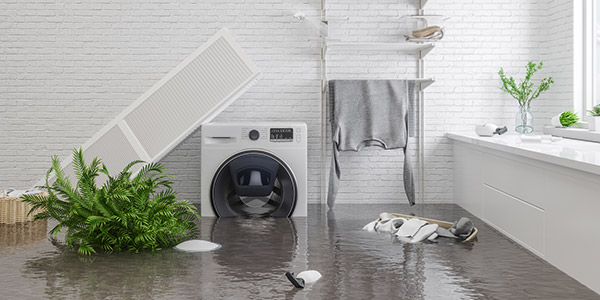Homeowners
How to Fix Your Wet Basement
March 24, 2016
There are many things to take into consideration when looking at a new home. Of the numerous aspects to look at, Bob Vila warned that one of the most important areas to inspect is the basement. If this area shows signs of a moisture problem, such as watermarks or a sump pump, it's a sign that costly repairs could be in your future if you decide to buy.1
Finding moisture of any amount in your home is never a fun thing to encounter. While many common home repairs are fairly straightforward, it can be difficult to determine the source of water infiltrating your basement. However, many homeowners face this problem sooner or later. According to the American Society of Home Inspectors, 60 percent of houses have wet basements. While it may take some hard work and patience, there is a solution for you and your home.2
The first thing you need to do when you find water in your basement is find the source. Of course, this is easier said than done. There are many possible causes of a basement leak. For instance, the water could be coming from outside, potentially the result of plants too close to your home or a clogged gutter. Or, there could be leaky pipes releasing water onto the floor every time a faucet is turned on. Realtor.com explained finding the ultimate cause may take some trial and error.3 However, it's crucial that you begin your efforts as soon as you find any water. Moisture left unaddressed could lead to mold, which could affect your health and that of your family.
Start on the Outside
A common cause of leaky basements is faulty gutters and downspouts. HouseLogic estimated the cost of repairing broken gutters could be a couple of hundred dollars.4 Though this may seem expensive, it's best to do this before the damage begins to harm your foundation.5 According to HomeAdvisor, water damage repair cost between $1,000 and $3,500 in 2015.6 Mold repair work alone can cost more than $500, HGTV explained.7
Downspouts should release water several feet away from your home. If they are shorter than this, consider temporarily adding extensions. Or, a landscaper could install a pipe underground to guide water away from your house.
Realtor.com noted that bushes and gardens planted too close to your house can compromise your foundation. Move your plant bed a few feet away from the building and make sure the soil nearby is sloping away. If it isn't, any rainfall will be directed straight to your basement.
Check Your Pipes
Once you know the exterior of your home is secure, move your search inside. According to the U.S. Environmental Protection Agency, the average home loses about 10,000 gallons of water every year to leaky pipes. One in ten homes loses 90 or more gallons of water a day.8 This costs Americans money on their water bills and the cost of repairs due to excess water can add up.
According to Popular Mechanics, a small leak in a pipe can be easily fixed with a piece of a garden hose.9 Once you find the leak, clean the pipe around it, add the piece of hose, and secure it in place with some hose clamps.
However, if your leak problem is bigger than a quick fix can solve, you may want to hire a professional to replace your pipes.
New Equipment
If your moisture problem is a recurring one that can't be fixed by moving plants or repairing pipes, you might want to invest in some new machinery in your basement. Specifically, dehumidifiers and sump pumps.
Wet basements caused by high humidity can be remedied with a dehumidifier, according to This Old House. Put the machine near an area of easy drainage. The dehumidifier will pull a lot of the moisture out of the air. Turning up the heat, especially during the winter, may also help lower the humidity level.
Humidity issues are commonly caused by condensation on cold water pipes, Popular Mechanics explained. Foam pipe insulation is the remedy for this and it's only necessary on some of the pipes. The insulation will keep air from reaching it and creating moisture.
For those basements that flood during storms, a sump pump is the most likely solution for you. Bob Vila explained that it's not wise to skimp when it comes to a sump pump purchase. Avoid the plastic ones and opt for the submersible models, because the lids on them keep debris out of the sump pit. This is important. You wouldn't want anything blocking the pump when it's needed most.
Realtor.com explained that if your basement is especially prone to flooding during storms, it's probably worth it to invest in a backup generator as well. The storms that pour water into your basement could also be the ones that knock the power out, preventing the pump from functioning. The two items together will be costly—about $4,000, Realtor.com estimated—but it's well worth it.
Sources
1 Bob Vila
2 American Society Home Inspectors
3 Realtors.com
4 HouseLogic
5 HouseLogic
6 HomeAdvisor
7 HGTV
8 United States Environmental Protection Agency
9 Popular Mechanics





 Smart Moves Start Here.
Smart Moves Start Here.